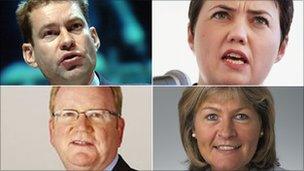'Fascinating dilemma' for Scottish Tories
- Published
- comments

The candidates are Murdo Fraser, Ruth Davidson, Jackson Carlaw and Margaret Mitchell
So there I was, loitering on a Glasgow southside boulevard outside the modest Tory rooms which I last recall as the party's base in the Govan by-election a generation ago.
The light was fading, there was an incipient drizzle - but still there was a palpable air of enthusiasm among the Conservative Party members arriving for the hustings.
My thanks to those who paused to offer their opinions to me and my camera-wielding colleague, Pete Cole. Respect to those who preferred to keep their views for the private discussion inside the hall.
One who paused told me how uplifting it was to be experiencing a genuine policy and strategy debate within the Tories.
Hadn't that, I inquired mischievously, happened in the past? "You might say that . . .", he replied with comparable mischief, leaving me to fill in the maxim from House of Cards.
Another who paused was positively ecstatic about the cathartic properties of an open election - with members, for the first time, choosing the leader for the entirety of the Tory Party in Scotland and not just at Holyrood.
However, that "entirety" is a notably smaller political beast than once it was, diminished in stature, reduced in electoral appeal.
Hence the core of this contest rests upon the proposal by one candidate, Murdo Fraser, to replace the current set-up with a new centre-right party, distinct from but allied to the Tories south of the border.
Chatting to folk last night, it was intriguing to note that views are far from entrenched in all quarters.
Yes, some were deeply and utterly hostile, regarding the move as tantamount to betraying the Tory name.
Yes, some were supportive, arguing that the party was currently seen as "English" and could not thrive until it developed a clear Scottish identity.
But others were unsure. Instinctively, they mistrust change: they are conservative, after all.
In essence, they wish things were other than they are. They wish Scots would simply turn to the Tories. They wish they didn't have to think about the challenge posed by Mr Fraser.
But, equally, they see there might be some merit in the argument for substantial change. They hear the arguments advanced by the other contenders - Ruth Davidson, Jackson Carlaw and Margaret Mitchell.
They hear, they listen. But they are willing to give Murdo Fraser an audience too.
My sojourn on a Glasgow pavement reminded me, once more, that one should never treat a political party, any political party, as an unyielding homogeneous block.
Encouraging sceptics
That said, he faces a self-imposed problem.
This is now a quasi-referendum - and, by definition, those who have not chosen him as their first preference may find it difficult to endorse his approach as a second choice. But only "may".
Then there is another point. This referendum is only quasi.
Even if Murdo Fraser wins, his proposal for a new party would have to win the support of two thirds of the members at a specially constituted conference.
That introduces two further elements. One, it has allowed David McLetchie, the former leader, to endorse Murdo Fraser while lodging an important caveat - which is that party members "will want to be assured on many points" before final consent is given to the new party.
That element, if accepted, may - again, may - encourage sceptics to give Mr Fraser their support as leader while retaining the right to veto his new party if they are not, ultimately, convinced.
Against that, though, is the other additional element.
Say Murdo Fraser wins - and cannot gain the requisite support for his proposal. He would then be left leading a party which he has said "cannot succeed in its current form".
A dilemma which would require some finesse.
I'm with the folk on that Glasgow pavement. This is fascinating.